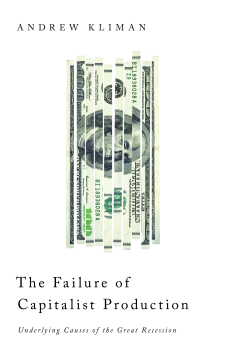
Additional Information
Book Details
Abstract
The recent financial crisis and Great Recession have been analysed endlessly in the mainstream and academia, but this is the first book to conclude, on the basis of in-depth analyses of official US data, that Marx's crisis theory can explain these events.
Marx believed that the rate of profit has a tendency to fall, leading to economic crises and recessions. Many economists, Marxists among them, have dismissed this theory out of hand, but Andrew Kliman's careful data analysis shows that the rate of profit did indeed decline after the post-World War II boom and that free-market policies failed to reverse the decline. The fall in profitability led to sluggish investment and economic growth, mounting debt problems, desperate attempts of governments to fight these problems by piling up even more debt - and ultimately to the Great Recession.
Kliman's conclusion is simple but shocking: short of socialist transformation, the only way to escape the 'new normal' of a stagnant, crisis-prone economy is to restore profitability through full-scale destruction of existing wealth, something not seen since the Depression of the 1930s.
'One of the very best of the rapidly growing series of works seeking to explain our economic crisis. ... The scholarship is exemplary and the writing is crystal clear'
Professor Bertell Ollman, Department of Politics, NYU, author of Dance of the Dialectic
'Essential reading for all Marxists and lefts interested in what caused the Great Recession. It debunks the fads and fashionable arguments of neoliberalism, underconsumption and inequality with a battery of facts. It restores Marx's law of profitability to the centre of any explanation of capitalist crisis with compelling evidence and searching analysis. It must be read'
Michael Roberts
'Clear, rigorous and combative. Kliman demonstrates that the current economic crisis is a consequence of the fundamental dynamic of capitalism, unlike the vast bulk of superficial contemporary commentary that passes for economic analysis'
Rick Kuhn, Deutscher Prize winner, Reader in Politics at the Australian National University and long-time activist.
'Among the myriad publications on the present day crisis, this work stands out as something unusual. Kliman is an excellent theorist, and an equally excellent analyst of empirical data'
Paresh Chattopadhyay, Université du Québec à Montréal
Table of Contents
| Section Title | Page | Action | Price |
|---|---|---|---|
| Cover | Cover | ||
| Contents | vii | ||
| List of Tables | viii | ||
| List of Figures | ix | ||
| List of Abbreviations | xi | ||
| Acknowledgments | xii | ||
| 1. Introduction | 1 | ||
| 2. Profitability, the Credit System, and the \"Destruction of Capital | 13 | ||
| 3. Double, Double, Toil and Trouble: Dot-com Boom and Home-price Bubble | 28 | ||
| 4. The 1970s -Not the 1980s- as Turning Point | 48 | ||
| 5. Falling Rates of Profit and Accumulation | 74 | ||
| 6. The Current-cost \"Rate of Profit | 102 | ||
| 7. Why the Rate of Profit Fell | 123 | ||
| 8. The Underconsumptionist Alternative | 151 | ||
| 9. What is to be Undone? | 181 | ||
| Notes | 208 | ||
| Bibliography | 227 | ||
| Index | 234 |
